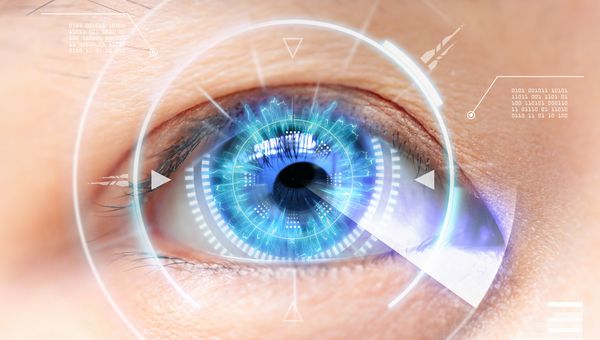The first thing that comes to mind when hearing the word glaucoma is can you go blind from glaucoma?
This can be a frightening thought because glaucoma is often called “the silent thief of sight.”. After all, it’s usually painless and can attack without any warning signs.
In fact, signs of glaucoma may not show up until late in life as a person’s eyesight deteriorates over time without any other symptoms showing up at all!
This means that it is essential for everyone to understand the risk factors and symptoms of glaucoma so they can get treatment if needed.
In this blog post, we will tell you how early you can go blind from this disease. We’ll also discuss the pathological features of glaucoma to give some more insight into this disease.
Finally, we’ll share what you can do to take care of your eyes and some advice on overcoming the danger of blindness from glaucoma.
Stay tuned!
How Early Can You Go Blind from Glaucoma?
There is no definitive answer to this question as it can depend on several factors, including the severity of glaucoma and how early it is diagnosed.
According to the National Eye Institute, in some cases, progressive vision loss due to glaucoma can begin as early as 40-60 years of age.
Generally, the longer one has had glaucoma without treatment, the more likely they will go blind from it.
Of course, this is not always true because there are many factors that come into play with progressive vision loss.
For example, it is believed that with higher pressures in the eye (intraocular pressure or IOP), glaucoma will progress more quickly than if one has lower intraocular pressure.
It can take about 15 years to go blind with an IOP of 21-25 mm Hg, while it can take about seven and a half years when the pressure in your eye is 25-30 mmHg.
When the pressure in your eye is more than 30 mmHg, it can progress within two to three years.
Additionally, people with other health conditions such as diabetes tend to go blind from glaucoma sooner because of comorbidities.
Finally, other pathological features of glaucoma may also speed up vision loss, such as severe optic nerve damage and large cupping areas, which indicate a very poor chance for recovery from treatment.
That said, if signs of glaucoma are detected and treated early on, blindness from the disease can be prevented in many cases.
Glaucoma: A Optic Nerve Neurodegenerative Disease
Just like other neurodegenerative diseases such as Alzheimer’s and Parkinson’s, glaucoma is a disease that affects the nervous system.
Specifically, glaucoma is often considered a neurodegenerative disease because it damages the optic nerve composed of the nerve fibers (axons) of the retinal ganglion cells.
These retina ganglion cells transmit visual signals from the eye to the brain, and once glaucoma causes them to degenerate and die, this connection between the eye and brain is lost.
The damage to the retina ganglion cells begins with their axons as they extend from the back of the eye and spread through the optic nerve, which is located in front of each eyeball.
These axons are very delicate and susceptible to injury due to high intraocular pressure (IOP), glaucoma, and other pathological features.
As these axons degenerate, the optic nerve becomes smaller in diameter, leading to less of its signal reaching the brain.
This is what causes vision loss for people with glaucoma because they can no longer see clearly due to a progressive decrease in visual signals received by the brain.
Also, glaucoma damages these retina ganglion cells in a pattern that starts at the peripheral (side) vision and progresses to the center of your field of view.
This is because as glaucoma damages these retina ganglion cells, it also interferes with their blood supply which comes from the retina.
Therefore, when the cells are damaged to a certain extent, they can no longer send as much blood supply to this area of your eye.
After that, these eye diseases progress into central vision once more, and more retinal ganglion cells die.
This is why vision changes typically go unnoticed when glaucoma initially develops because it starts with damage to peripheral (side) vision before it affects other parts of your field of view.
Glaucoma: A Slowly Progressive Disease
Typically, glaucoma is a slowly progressive disease which means that it can take years before the damage to your eye becomes noticeable.
This simply means that the damage done to your retina ganglion cells accumulates over time, leading to a gradual and permanent vision loss.
For instance, glaucoma may begin as early as 40-60 years of age, but vision loss from this type of optic neuropathy typically occurs after 60-70 years old.
Moreover, primary open-angle glaucoma is the most common type of glaucoma, and it progresses very slowly in many cases.
This means that someone who has this form of the disease may lose some vision over time but will likely still live independently and perform their usual activities.
On the flip side, acute angle-angle closure glaucoma is a more sudden-onset form of the disease which causes more severe vision loss in less time.
Although this type of glaucoma is rare, it can be severe and even cause blindness if left untreated or improperly treated.
This is because this type of glaucoma occurs when the angle between the iris and cornea becomes too narrow, obstructing blood flow, fluid drainage, or both.
As such, the treatment of glaucoma is different depending on the type of glaucoma, and it aims to slow the progression of this disease into a more severe stage.
Factors of Quick Blindness
Though glaucoma is a slowly progressive disease, some factors can lead to quick blindness in a shorter amount of time. They are:
-
- Retinal artery occlusion or retinal vein occlusion
- Severe optic nerve compression
-
- A tumor or lesion
- Macular edema
- Diabetic retinopathy
- Retinal detachment
- Cataracts
Overcoming the Danger of Blindness
Though glaucoma can lead to blindness, there are steps you can take to prevent this from happening.
By taking these steps early on, you can help slow the progress of glaucoma and maintain your vision to a high standard. Some steps include:
Step One. Identification at Earlier Stages
The earlier you are aware that you have glaucoma, the better.
Identifying the early stages of glaucoma is vital because it will allow your eye doctor to treat the disease before vision loss occurs.
This is because treatment is more effective when started in the early stages of the disease.
So, if you experience any of the symptoms associated with glaucoma, it is important to see your eye doctor right away.
Step Two: Routine Checkups by the Experts
After identifying that you have glaucoma, it is important to take your treatment plan seriously.
When the disease progresses, it can quickly lead to vision loss in a short amount of time.
This means regular checkups are vital for managing glaucoma and preserving your overall eye health over time.
It is also essential to have regular eye exams with an opthalmologist even if you do not feel anything wrong with your vision.
This way, they can test the pressure inside your eye and see if any changes occur from one visit to another, and perform a visual field examination that involves a computerized eye test.
If anything unusual is found during the tests, they will address it as soon as possible and hopefully prevent vision loss from glaucoma in time.
Step Three: Mark Your Eye Effects
To keep track of how glaucoma affects your vision, it is important to mark the disease’s effects on your eyes.
You can do this by using a journal or diary to record any changes you experience over time.
The more detailed information you have about what you are seeing or how much difficulty you’re having with vision can help your healthcare provider develop a personalized treatment plan that helps slow the progression of blindness.
Some everyday things to note in your journal could include:
- The date and time of day you experience vision problems
- Symptoms you are experiencing, such as halos around lights, blurred vision, or seeing colors differently than before
- How well you can see at different distances (near, far)
- If your eye medication is working effectively to control the pressure in your eyes
- If you are experiencing any changes in your field of vision
Medicinal And Visual Care Of Your Eyes
Apart from getting routine checkups and marking the progress of your glaucoma, there are some other things you can do to help you manage your vision and eye health. They may include medicinal and visual care.
Use prescribed Spectacles
Researchers from the Glaucoma Research Foundation found that many people with glaucoma are sensitive to light.
In fact, this sensitivity can increase the risk of developing cataracts.
To help reduce light sensitivity, your eye doctor may prescribe glasses that have been designed in a way that can protect your eyes from the harmful effects of bright lights.
They can also help reduce symptoms such as double vision and blurriness during activities like reading or working on a computer screen.
They can even decrease glare, which is common for people with this disease. Some of the common features found on these glasses may include:
-
- Brown, amber, or yellow lens tints
- UV protection
- Blue light blockage
- Anti-reflective (AR) coating
In addition to wearing prescription glasses, it is essential to wear sunglasses outdoors that offer significant ultraviolet (UV) protection.
You should also keep in mind that while sunglasses can protect your eyes from UV rays and help reduce glare, they are not the same thing as prescribed glasses for glaucoma.
Take Effective Medicines
In order to keep the pressure in your eyes under control, you need to take effective medicines as recommended by your eye doctor.
If necessary, your healthcare provider will also monitor and adjust how much of these medications you are taking each day (dose).
This is especially important for people who may suffer from side effects from their medications.
Some common types of glaucoma medication include:
- Prostaglandin Analogues (Latanoprost, Travatan Z)
- Beta Blockers (Timolol, Betaxolol)
- Carbonic Anhydrase Inhibitors (Diamox, Acetazolamide)
- Selective Alpha Agonists (Alphagan, Brimonidine)
- Cholinergic Blocking Agents (Pilocarpine, Isopto Carpine)
It is important to take all of your medications as prescribed by your doctor for them to be effective.
Skipping doses or taking less of your medications than prescribed can increase the risk that you will develop uncontrolled glaucoma.
Improve Visual Strength
To not only manage glaucoma but also slow down the progression of blindness, you must do what you can to improve your eyesight and keep your vision as strong as possible.
This may include lifestyle modifications, such as:
Exercising regularly: Getting regular exercise is important for your overall health and wellness, so it should come as no surprise that it can also help with open-angle glaucoma
Maintaining a healthy weight: Keeping your body at a comfortable and appropriate weight may help decrease the pressure in your eyes by lowering fat levels around them
Eating healthy foods rich in antioxidants: Many fruits and vegetables contain antioxidants that can help your body fight against free radicals. These are the harmful compounds known to cause damage inside of cells in your eyes, leading to vision loss. You may also include taking any supplements recommended for you by your healthcare provider
Getting plenty of sleep: Getting enough shut-eye each night will not only rejuvenate you during the day but also promote better recovery for your muscles and health overall. Also, sleeping with your head elevated on a pillow may help reduce the pressure in your eyes
Limiting your caffeine intake: Too much caffeine can not only lead to restlessness and sleeplessness but can also increase your eye pressure
Staying hydrated: Drinking plenty of water can help flush out any fluids in your body, including the ones around your eyes that may be putting too much pressure on them
Quitting smoking: Smoking cigarettes is bad for your overall health, including your eyesight. Tobacco smoke contains harmful chemicals that can damage the optic nerve and cause vision loss
In addition to making these small changes to improve your vision, it is important to visit your eye doctor regularly for checkups and screenings
Proper And Improper Treatments
According to Glaucoma Research Foundation, glaucoma is a condition that, if left untreated, can lead to blindness.
However, there are many different treatment options for glaucoma that work to lower the pressure in your eyes by either decreasing the production of fluid or helping to drain the fluid from your eyes.
However, these treatment options only help treat and manage this condition, not cure it.
People who have uncontrolled glaucoma may require surgery for their optic nerve damage to improve vision loss or prevent further eye problems.
Lastly, before starting any treatments, consult with your eye doctor to figure out the best plan for you.
To get the most out of your glaucoma treatments, it is important to:
Set Day to Day Tasks to Improvements
Whether you are improving your daily lifestyle or starting any treatments to help prevent or control visual loss, setting realistic goals for your eye improvement is important.
That is, you should focus on improving your visual tasks one day at a time.
For instance, if you notice that it has become more challenging to read the digital clock or see where you are walking, acknowledge this fact and make small steps towards fixing these issues every day.
Breaking up your larger goals into smaller tasks will also help keep you motivated and on track.
This way, by the end of the week, you will have made noticeable progress in completing these goals and improving your vision.
Working with a therapist may also help you develop these goals and stay on track.
Never Remain Undiagnosed
Early detection makes all the difference when it comes to managing this condition.
Remember, glaucoma is a progressive disease that can lead to blindness if left untreated. So, the best way to combat this is through early detection and treatment.
If you have any of the risk factors for glaucoma or are experiencing symptoms, visit your eye doctor and get screened as soon as possible to detect this disease in its early stages.
Most importantly, you must follow all recommendations from your eye doctor to maintain or improve vision.
Not only should you adhere to their recommended treatment but also take part in regular screenings so this disease can be detected early on before any permanent damage occurs.
Conciseness of Variations
There are many different types of glaucoma, each with its own variations in symptoms and treatment.
Therefore, you need to understand the type of glaucoma you have and discuss any concerns you may have with your eye doctor.
They will be able to recommend the best course of treatment for you and your specific form of glaucoma.
However, it is important to understand that no two people with the same type of glaucoma will be affected in the same way and similarly respond to treatments.
Therefore, you must communicate any concerns about these differences or changes with your eye doctor so they can help to adjust your treatment plan as needed.
Bottomline
Although nerve damage and visual loss from glaucoma cannot usually be reversed, early detection and treatment can help to prevent further damage and improve vision. And if you have any of the risk factors or symptoms for glaucoma, it is essential to visit your eye doctor for a screening as soon as possible. By following your doctor’s recommendations and taking part in regular screenings, you can work towards maintaining good vision and preventing blindness from this progressive eye disease. Stay motivated, stay healthy, and don’t give up!
Sources
- https://www.medicalnewstoday.com/articles/vision-loss
- https://www.brightfocus.org/glaucoma/article/how-long-does-it-take-go-blind-glaucoma
- https://salandvision.com/how-quickly-does-glaucoma-progress/
- https://www.aoa.org/healthy-eyes/eye-and-vision-conditions/glaucoma?sso=y
- https://preventblindness.org/glaucoma/#1586744207313-b4106bc6-5fe8
- https://delrayeyecare.com/general/diagnosis-of-glaucoma-and-its-progression/
- https://www.ncbi.nlm.nih.gov/pmc/articles/PMC4354096/
- https://www.mayoclinic.org/diseases-conditions/glaucoma/symptoms-causes/syc-20372839
Frequently Asked Questions
How long does it take to go blind from glaucoma?
The progression of glaucoma and how soon can one go blind varies depending on the individual and the type of glaucoma. However, blindness from this disease is often a slow process that can occur over many years if left untreated.
Will I go completely blind with glaucoma?
No, blindness from glaucoma is not usually a complete loss of vision. It can often be slowed down with early detection and treatment. However, it can lead to significant vision loss and even total blindness if left untreated.
Is eye pressure 50 mmHg high?
Yes, an eye pressure of 50 mmHg is high and can be indicative of glaucoma. However, this number can vary from person to person so it is important to discuss any concerns you have about your eyes with your doctor.
What age do you usually get glaucoma?
The age at which you are most likely to get glaucoma can vary depending on the type of glaucoma. However, it is most common in people over the age of 40.
Do you need to wear glasses if you have glaucoma?
It depends on the type of glaucoma you have and your individual situation. However, oftentimes people with glaucoma do need to wear glasses to protect their vision. Talk to your doctor about what is best for you.
Are glaucoma drops for life?
The drops you are prescribed for glaucoma will vary depending on the type of disease you have. However, in most cases, they do not need to be used forever and can be stopped when your condition is stable or if there are no further changes with vision loss.





